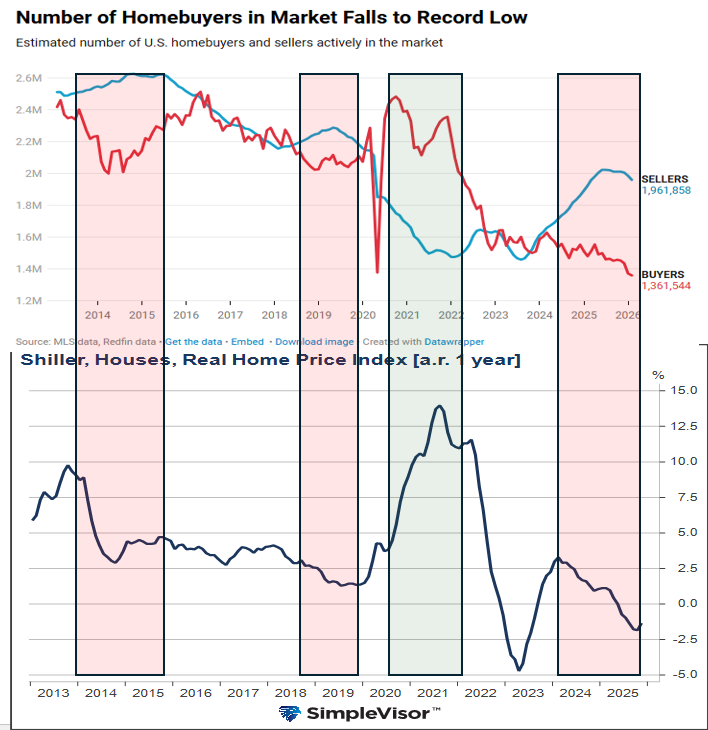The year has begun on a tumultuous note. The Nikkei, DAX and S&P 500 all gapped lower the first day of the year. However, heightened anxiety has calmed as the fire appears to have burnt itself out, and equities have moved higher over the past two week.
Three sources of stress have eased. Investors are no longer taking their cues by what happens to Chinese stocks. Nevertheless, both the Shanghai and Shenzhen Composites are posting small gains for the month of February, unlike most bourses. Second, the yuan has stabilized. The onshore yuan is off 0.7% so far this year, while the offshore yuan is up 0.35%. In February, the onshore yuan is up 0.5%, and the offshore is up 0.7%.
A third source of anxiety has been the risk of a recession in the US after a dismal Q4 15. However, growth was revised up to a 1.0% annualized pace, which, while disappointingly low, is not a harbinger of a recession. To the contrary, most of the key real sector data, like the employment details, retail sales, manufacturing output and durable goods orders point to an economy that is rebounding in Q1 16.
Moreover, despite past decline in oil prices and dollar strength, both the core CPI and core PCE deflator have risen to new 2-3 year highs. Fed hiked rates in December, but it did not knock the US economy into a recession as the doomsday talk suggested. Meanwhile, between Brexit fears, and disappointing eurozone data (PMIs and preliminary February CPI), and new threat of stagnation and deflation in Japan, the contrasting macro picture seems distinctly dollar supportive.
We identify 13 things that investors will be watching in the week ahead:
1. US employment: Slack in the US labor market continues to be absorbed. The consensus calls for a modest improvement from the 151k (158k private sector) increase in January. The trend lower in weekly jobless claims favors another healthy report. Earnings growth may rise 0.2% which is needed to keep the year-over-year rate steady at 2.5%. The combination of continued improvement in the labor market and gradual increases in core inflation will likely support officials to continue to normalize monetary policy. While the market turmoil and the decline in inflation expectations may keep the Fed steady in March, we anticipate hike in Q2. Separately, auto sales will be reported on March 1. A sequential increase is expected, which may be picked up by the next retail sales report, and points to rebounding consumption, the single largest economic driver, in Q1.
2. Super Tuesday: For many, the US presidential contest has thus far been an entertaining distraction. However, things are about to become more serious. On the Democratic side, Sanders may stay until the end, but after the primaries on March 1, Clinton will have probably have secured almost 2/3 of the delegates needed to secure the nomination. On the Republican-side, Trump is ahead in nearly every poll for the states that have primaries or caucuses on Super Tuesday. Investors have yet to respond to the risk that Trump gets the Republican nomination. While many are talking about who can stop Trump, in our experience, the hubris that is on display is often its own nemesis.
3. German politics: Even if investors have not reacted to the prospects of a Trump victory, they are talking about it. In contrast, there is a shift taking place in German politics that the event markets are implying about a one in three chance that Merkel is not in office at the end of the year. In themselves, any one state election in Germany is not particularly significant. However, the trend matters. Municipal elections will be held in the Hesse on 6 March. A week later, three states (Baden-Wurttemberg, Rhineland-Palatinate, and Saxony-Anhalt. The AfP party that had been born as an anti-EU party has become among the most vocal critics of Merkel's refugee stance. It was not around to participate the last time the states had elections in 2011.
4. Spanish and Irish governments: Spain's elections were in December. Finally, a minority coalition of the Socialists (PSOE) and the new centrists (Ciudadanos) will seek investiture by parliament. The two parties together hold 130 of the 350 seats. It needs to secure an absolute majority in the first round. It will likely fail, and the markets may respond negatively. However, the it is the second round that is key, which likely would be held before the weekend. Here only a simple majority is needed, so abstentions by the opposition could pave the way for a minority government. Failure to secure parliamentary approval likely will force a new election.
The results of the Irish election are not final. It may take another day to two to sort it out. Fine Gael likely remained the single biggest party but received a little more than a quarter of the voters. Kenny ran a poor campaign and may not lead the next government. Fien Gael's traditional rival, Fianna Fail, appears to have gotten around 22% of the vote. In Ireland's electoral system, that would likely be sufficient to forge a majority. However, what seems to be clear is that the most stable government between the two largest parties is politically awkward. The current junior coalition member, Labour looks to have done worse than expected. It may have secured a little less than 8% of the vote. Sinn Fein, new parties, and independents seems to have gained. The anti-elitist pushback is evident even in Ireland, whose economy continues to be among the fastest growing in EMU. Like Spain and Portugal before it, the electoral result of political fragmentation appears to be the second phase of the economic and financial crisis.
5. RBA meeting: The Reserve Bank of Australia is the first of several central banks that meet in March. It will likely maintain the current record low cash rate of 2%. None of the 27 respondents to the Bloomberg survey expect a change. Governor Stevens has indicated a wait and watch mode. The RBA has shaped expectations by noting that the low inflation gives the central bank the flexibility to ease policy if necessary. Another poor labor market report (March 16) though could push the central bank into using that flexibility. The Australian dollar has been trending higher since mid-January, appreciating about 6.5% against the US dollar. However, the price action before the weekend was poor, with a one-day reversal pattern recorded, encouraged perhaps by the RBA's Edwards expressing the desire of the Aussie to be nearer $0.6500.
6. China PMIs and NPC: The market has taken on board that the Chinese economy has slowed. However, it does appear the economy may be stabilizing. The PMIs are being looked upon for confirmation. Chinese have made two points for global investors. First that it is not seeking a large devaluation. Some hedges might be pushing for it, but Chinese officials have spent several hundred billions of reserves to offset some of the pressure. The main criticism levied against China was not about what it was doing, but the transparency of its operations and its communication. The fourth session of the 12th National People's Congress will open on March 5. Although the role of China's legislature still seems to be evolving, the concentration of power by President Xi warns against expecting fresh initiatives. Still the event will offer an opportunity to the reiteration of some broadside economic, social and political goals.
7. Swiss referendum: The Swiss people go to the polls today, February 28 to vote on four initiatives. There is only one that has potential direct impact on international investors. It is the motion that would ban speculation in foodstuffs, which could if passed, impact producers such as Nestle. Two other initiatives will be of interest. The first is calls for the expulsion of foreign-born lawbreakers, and the second calls for enshrining the traditional definition of marriage. The final initiative is about another tunnel through the Alps.
8. Eurozone data: The case for additional action by the ECB at the March 10 meeting is based on the poor economic outlook and the failure thus far to offset disinflationary forces. The economic data out in the coming days will only reinforce those arguments. German, French and Spanish preliminary inflation reports for February warns of a poor aggregate report. The 0.3% year-over-year rise in January is expected to fall to zero, and the risk is lower still. Core inflation is expected to have eased to 0.9% from 1.0%. The PMIs may pick up additional softness in the periphery, and the price index and the forward-looking new orders components were already disappointing.
We have emphasized the divergence between the US and Europe. It extends beyond monetary policy. It includes the dealing with the non-performing loans at banks. The divergence is also about labor. Using comparable definitions, the eurozone will report a 10.4% unemployment rate in January. Eurozone unemployment peaked at 12.1% in March and April 2013. US unemployment peaked at 10% in October 2009. In January, it stood at 4.9%.
The eurozone has also generated less aggregate demand. This will be illustrated with the January retail sales report. January sales are expected to have risen 0.1% for a 1.3% year-over-year pace, the slowest since November 2014. On the back of such data, and ahead of the ECB meeting, it is difficult to see a compelling case for discretionary traders to increase euro exposure.
9. Non-EU Europe: Two countries stand out. The UK, where Brexit fears have given sterling a drubbing, and Sweden where the central bank is pursuing aggressive monetary policy despite strong economic activity and a large current account surplus. The price action in sterling suggest the selling has not consumed itself. It is not so much that investors we talk with anticipate the UK leaving the EU, but rather they are taking precautions. Softer UK economic data, especially from the service and manufacturing PMIs, will do sterling few favors. The Brexit debate has also been infused with anti-establishment flavor.
Sweden is a different story. In the week ahead the economic data is likely to point to an economy that is the envy of many. Growth in the last three months of 2015 is expected to have been 0.7%. The economy grew by 3.6% last year. The manufacturing and service PMIs may slow but will remain at lofty levels (Bloomberg consensus is for 55.0 and 58.1 respectively). Industrial output and services are growing 5.7%-6.0%. The central bank has imposed negative rates and is engaged in a bond buying program. Why? Headline CPI is 0.8% and when adjusted for fixed rate mortgages rises to 1.6%.
10. Canadian data: Canada is continues to struggle with its terms of trade shock. The economy is stagnant. GDP may have risen by 0.1% in December, but Q4 growth was likely flat. The central bank is signaling it is waiting for the new government's budget, which may still be six weeks away. The recent strength of the Canadian dollar (~8% since mid-January on a trade-weighted basis) and backing up of interest rates (20 bp increase of the two-year yield since February 11) is a premature tightening of financial conditions.
11. G20: For the most part the G20 statement reiterated past comments and concerns. Its language on the limits of monetary policy were stronger, and members reaffirmed their willingness to use the flexibility of fiscal policy and avoid competitive devaluations. In response to surprises by China and Japan, officials pledged to "consult closely" on matters that impact exchange rates. Reports indicate that there was much discussion over the BOJ's recent move to negative interest rates. Official comments suggest that the bar to BOJ intervention to weaken the yen. British officials managed to get Brexit included into the lists of risks, which also includes volatile markets, low priced commodities, and immigration. China succeeded in getting the final statement to include a reference to G20 examining the possible broader use of the SDR. It seemed more like an ideological achievement rather than substantive. As Chinese Finance Minister Lou Jiwei acknowledged, the SDR is primarily pricing tool (unit of account) and its use is up to the discretion of individual countries.
12. Iran election: Iran appears to have supported what is seen as the moderate regime of President Rouhani who oversaw the nuclear negotiations. A victory for the moderates is seen as favoring a new opening up of Iran to foreign investment. The results may boost Rouhani's chances to be re-elected in next year's presidential contest. Rouhani directed the strategic decision to accept a freeze of its nuclear ambitions for the lifting of the sanctions. He cannot now offer to limit Iranian oil exports to participate in an effort to boost prices.
13. Brazil central bank: The central bank meets March 2. The concern about the deepening recession likely will more than offset the inflation worries. The Selic rate is expected to remain steady at 14.25%. The real is flat this month and off a little less than 1% year-to-date. While this is better than most emerging market currencies, the political and economic climate is worrisome, and our proprietary model warns of further downgrade risks.
Tags:



























